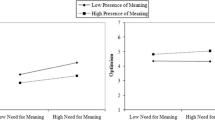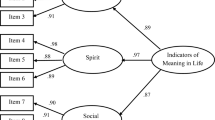Abstract
Recent findings have shown that existential experiences are complex and, at least theoretically, it could be separated into several different categories (meaningfulness, crisis of meaning, existential indifference, and existential conflict). In this study, we sought to examine in a large Brazilian sample (N = 3,034 subjects, from 22 Brazilian states) the plausibility of existence of these categories and how people inserted on them would differ in terms of sociodemographic variables and psychological functioning (engagement with sources of meaning and scores on a set of dispositional and well-being constructs). Our results showed the existence of all four categories of meaning. Men were more frequently classified into the existentially indifferent and crisis of meaning groups. The meaningfulness group presented higher scores in all sources of meaning when compared to other groups, whereas the existentially indifferent group presented the lowest scores. A highly diverse pattern of relationships between the sources of meaning and the levels of meaningfulness for the different categories of meaning was found. Significant differences between the existential indifference and the existential conflict groups were found for subjective happiness, life satisfaction and self-esteem but not found for optimism, pessimism, hope (agency and pathways), and self-efficacy.


Similar content being viewed by others
References
Abdi, H. (2007). Bonferroni and Šidák corrections for multiple comparisons. In N. J. Salkind (Ed.), Encyclopedia of measurement and statistics (pp. 103–107). Thousand Oaks, CA: Sage.
Antonovsky, A. (1993). The structure and properties of the Sense of Coherence Scale. Social Science and Medicine, 36(1), 725–733. doi:10.1016/0277-9536(93)90033-Z.
Bastianello, M. R., Zanon, C., Pacico, J. C., Reppold, C., & Hutz, C.S. (in press). Optimism, self-esteem, and personality: adaptation and validation of the Revised Life Orientation Test LOT-R. Psico-USF.
Battista, J., & Almond, R. (1973). The development of meaning in life. Psychiatry, 36(4), 409–427. http://www.ncbi.nlm.nih.gov/pubmed/4756415.
Bauer-Wu, S., & Farran, C. J. (2005). Meaning in life and psycho-spiritual functioning: A comparison of breast cancer survivor and healthy women. Journal of Holistic Nursing, 23(2), 172–190. doi:10.1177/0898010105275927.
Carver, C. S., & Scheier, M. F. (2002). Optimism. In C. R. Snyder & S. J. Lopez (Eds.), Handbook of positive psychology (pp. 231–243). New York: Oxford University Press.
Cohen, J., & Cohen, P. (1983). Applied multiple regression/correlation analysis for the behavioral sciences (2nd ed.). Hillsdale, NJ: Lawrence Erlbaum Associates.
Compton, W. C. (2000). Meaningfulness as a mediator of subjective well-being. Psychological Reports, 87(1), 156–160. doi:10.2466/pr0.2000.87.1.156.
Crumbaugh, J. C., & Maholick, L. T. (1964). An experimental study in existentialism: The psychometric approach to Frankl’s concept of noogenic neurosis. Journal of Clinical Psychology, 20(1), 589–596. doi:10.1002/1097-4679(196404)20:2<200:A.
Crumbaugh, J. C. (1968). Cross-validation of purpose in life test based on Frankl's concepts. Joumal of lndividual Psychologv, 24(1), 74–81. http://www.ncbi.nlm.nih.gov/pubmed/4385494.
Damásio, B. F., Schnell, T., & Koller, S. H. (2013). Sources of Meaning and Meaning in Life Questionnaire (SoMe): Psychometric properties and sociodemographic findings in a large Brazilian sample. Acta de Investigación Psicológica, 3(3), 1205–1227. http://www.scielo.org.mx/pdf/aip/v3n3/v3n3a2.pdf.
Damásio, B. F., Zanon, C., & Koller, S. H. (2014). Validation and psychometric properties of the Brazilian version of the Subjective Happiness Scale. Universitas Psychologica, 13(1), 1–13. doi:10.11144/Javeriana.UPSY13-1.vppb.
Debats, D. L., van der Lubbe, P. M., & Wezeman, F. R. A. (1993). On the psychometric properties of the Life Regard Index (LRI): A measure of meaningful life. An evaluation in three independent samples based on the Dutch version. Personality and Individual Differences, 14(2), 337–345. doi:10.1016/0191-8869(93)90132-M.
DeWitz, S. J., Woolsey, M. L., & Walsh, W. B. (2009). College student retention: An exploration of the relationship between self-efficacy beliefs and purpose in life among college students. Journal of College Student Development, 50(1), 19–34. doi:10.1353/csd.0.0049.
Diener, E., Emmons, R. A., Larsen, R. J., & Griffin, S. (1985). The Satisfaction with Life Scale. Journal of Personality Assessment, 49(1), 71–75. doi:10.1207/s15327752jpa4901_13.
Edwards, M. J., & Holden, R. R. (2001). Coping, meaning in life and suicidal manifestations examining gender differences. Journal of Clinical Psychology, 57(12), 1517–1534. doi:10.1002/jclp.1114.
Emmons, R. A. (2003). Personal goals, life meaning, and virtue: Wellsprings of a positive life. In C. L. M. Keyes & J. Haidt (Eds.), Flourishing: Positive psychology and the life well-lived (pp. 105–128). Washington, DC: American Psychological Association.
Emmons, R. A., & Shelton, C. M. (2002). Gratitude and the science of positive psychology. In C. R. Snyder & S. J. Lopez (Eds.), Handbook of positive psychology (pp. 459–471). New York: Oxford University Press.
Fillion, L., Duval, S., Dumont, S., Gagnon, P., Tremblay, I., Bairati, I., et al. (2009). Impact of meaning-centered intervention on job satisfaction and on quality of life among palliative care nurses. Psycho-oncology, 18(1), 1300–1310. doi:10.1002/pon.1513.
Frankl, V. E. (1963). Man’s search for meaning: An introduction to Logotherapy. New York: Washington Square Press.
Frankl, V. E. (1978). The unheard cry for meaning: Psychotherapy and humanism. New York: Washington Square Press.
Glück, J., & Blcuk, S. (2013). The MORE life experience model: A theory of development of personal wisdom. In M. Ferrari & N. M. Weststrate (Eds.), The scientific study of personal wisdom: From contemplative tradition to neuroscience (pp. 75–98). New York: Springer.
Gouveia, V. V., Milfont, T., Fonseca, P. N., & de Miranda Coelho, J. A. P. (2009). Life satisfaction in Brazil: Testing the psychometric properties of the Satisfaction with Life Scale (SWLS) in five Brazilian samples. Social Indicators Research, 90(2), 267–277. doi:10.1007/s11205-008-9257-0.
Haukoos, J. S., & Lewis, R. J. (2005). Advanced statistics: Bootstrapping confidence intervals for statistics with “difficult” distributions. Academic Emergency Medicine, 12(4), 360–365. doi:10.1197/j.aem.2004.11.018.
Heine, S. J., Proulx, T., & Vohs, K. D. (2006). The meaning maintenance model: On the coherence of social motivations. Personality and Social Psychology Review, 10(2), 88–110. doi:10.1207/s15327957pspr1002_1.
Ho, M. Y., Cheung, F. M., & Cheung, S. F. (2010). The role of meaning in life and optimism in promoting well-being. Personality and Individual Differences, 48(1), 658–663. doi:10.1016/j.paid.2010.01.008.
Hutz, C. S., & Zanon, C. (2011). Revisão da adaptação, validação e normatização da escala de autoestima de Rosenberg. Avaliação Psicológica, 10(1), 41–49.
King, L. A., Hicks, J. A., Krull, J. L., & Del Gaiso, A. K. (2006). Positive affect and the experience of meaning in life. Journal of Personality and Social Psychology, 90(1), 179–196. doi:10.1037/0022-3514.90.1.179.
Lyubomirsky, S., & Lepper, H. S. (1999). A measure of subjective happiness: Preliminary reliability and construct validation. Social Indicators Research, 46(1), 137–155. doi:10.1023/A:1006824100041.
Mascaro, N., & Rosen, D. H. (2005). Existential meaning‘s role in the enhancement of hope and prevention of depressive symptoms. Journal of Personality, 73(4), 985–1014. doi:10.1111/j.1467-6494.2005.00336.x.
McKnight, P. E., & Kashdan, T. B. (2009). Purpose in life as a system that creates and sustains health and well-being: An integrative, testable theory. Review of General Psychology, 13(3), 242–251. doi:10.1037/a0017152.
McMahan, E. A., & Renken, M. D. (2011). Eudaimonic conceptions of well-being, meaning in life, and self-reported well-being: Initial test of a mediational model. Personality and Individual Differences, 51(5), 589–594. doi:10.1016/j.paid.2011.05.020.
Melton, A. M. A., & Schulenberg, S. E. (2007). On the relationship between meaning in life and boredom proneness: Examining a Logotherapy postulate. Psychological Reports, 101(1), 1016–1022. doi:10.2466/pr0.101.4.1016-1022.
Pacico, J. C., Bastianello, M. R., Zanon, C., & Hutz, C.S. (in press). Adaptation and validation of the dispositional hope scale for adolescents. Psicologia: Reflexão e Crítica.
Patton, M. Q. (1990). Qualitative evaluation and research methods (2nd ed.). Newbury Park: Sage.
Podsakoff, P. M., MacKenzie, S. B., Lee, J.-Y., & Podsakoff, N. P. (2003). Common method biases in behavioral research: A critical review of the literature and recommended remedies. Journal of Applied Psychology, 88(5), 879–903. doi:10.1037/0021-9010.88.5.879.
Rathi, N., & Rastogi, R. (2007). Meaning in life and psychological well-being in preadolescents and adolescents. Journal of the Indian Academy of Applied Psychology, 33(1), 31–38. http://medind.nic.in/jak/t07/i1/jakt07i1p31.pdf.
Robinson, C., & Snipes, K. (2009). Hope, optimism and self-efficacy: A system of competence and control enhancing African American college Students academic well-being. Multiple Linear Regression Viewpoints, 35(2), 16–26. http://mlrv.ua.edu/2009/vol35_2/Robinson_Snipes_proof_2.pdf.
Rosenberg, M. (1989). Society and the adolescent self-image, revised edn. Middletown, CT: Wesleyan University Press.
Ryff, C. D., & Singer, B. H. (2006). Know thyself and become what you are: A eudaimonic approach to psychological well-being. Journal of Happiness Studies, 9(1), 13–39. doi:10.1007/s10902-006-9019-0.
Scannell, E. D., Allen, F. C. L., & Burton, J. (2002). Meaning in life and positive and negative well-being. North American Journal of Psychology, 4(1), 93–112.
Scheier, M. F., Carver, C. S., & Bridges, M. W. (1994). Distinguishing optimism from neuroticism (and trait anxiety, self-mastery, and self-esteem)—a reevaluation of the Life Orientation Test. Journal of Personality and Social Psychology, 67(6), 1063–1078. doi:10.1037/0022-3514.67.6.1063.
Schnell, T. (2009). The Sources of Meaning and Meaning in Life Questionnaire (SoMe): Relations to demographics and well-being. Journal of Positive Psychology, 4(6), 483–499. doi:10.1080/17439760903271074.
Schnell, T. (2010). Existential indifference: Another quality of meaning in life. Journal of Humanistic Psychology, 50(1), 351–373. doi:10.1177/0022167809360259.
Schnell, T. (2011). Individual differences in meaning-making: Considering the variety of sources of meaning, their density and diversity. Personality and Individual Differences, 51(1), 667–673. doi:10.1016/j.paid.2011.06.006.
Schnell, T., & Becker, P. (2006). Personality and meaning in life. Personality and Individual Differences, 41(1), 117–129. doi:10.1016/j.paid.2005.11.030.
Schnell, T., & Becker, P. (2007). Der Fragebogen zu Lebensbedeutungen und Lebenssinn (LeBe) [The Sources of Meaning and Meaning in Life questionnaires]. Göttingen, Germany: Hogrefe.
Schwarzer, R., Boehmer, S., Luszczynska, A., Mohamed, N. E., & Knoll, N. (2005). Dispositional self-efficacy as a personal resource factor in coping after surgery. Personality and Individual Differences, 39(4), 807–818. doi:10.1016/j.paid.2004.12.016.
Schwarzer, R., & Jerusalem, M. (1995). Generalized Self-Efficacy Scale. In J. Weinman, S. Wright, & M. Johnston (Eds.), Measures in health psychology: A user’s portfolio. Causal and control beliefs (pp. 35–37). Windsor: Nfer-Nelson.
Silveira, A. C., Castro, T. G., & Gomes, W. B. (2011). Adaptação da escala de autoabsorção para adultos brasileiros [Adaptation of the Self-Absorption Scale for Brazilian adults]. Interação em Psicologia, 15(1), 1–10. http://ojs.c3sl.ufpr.br/ojs2/index.php/psicologia/article/view/17472/16504.
Snyder, C. R., Harris, C., Anderson, J. R., Holleran, S. A., Irving, L. M., Sigmon, S. X., et al. (1991). The will and the ways: Development and validation of an individual-differences measure of hope. Journal of Personality and Social Psychology, 60(4), 570–585.
Snyder, C. R., Rand, K. L., & Sigmon, D. R. (2002). Hope theory: A member of the positive psychology family. In C. R. Snyder & S. J. Lopez (Eds.), Handbook of Positive Psychology (pp. 257–276). New York: Oxford University Press.
Steger, M. F. (2009). Meaning in life. In S. J. Lopez, (Ed.), Encyclopedia of positive psychology (Vol. 2., pp. 605–610). Oxford, UK: Wiley-Blackwell Publishing.
Steger, M. F., & Frazier, P. (2005). Meaning in life: One link in the chain from religiousness to well-being. Journal of Counseling Psychology, 52(4), 574–582. doi:10.1037/0022-0167.52.4.574.
Steger, M. F., Frazier, P., Oishi, S., & Kaler, M. (2006). The meaning in life questionnaire: Assessing the presence of and search for meaning in life. Journal of Counseling Psychology, 53(1), 80–93. doi:10.1037/0022-0167.53.1.80.
Tabachnick, B. G., & Fidell, L. S. (2012). Using multivariate statistics (6th ed.). Boston: Allyn and Bacon.
Teixeira, M. A. P. & Dias, A. C. G. (2005). Propriedades psicométricas da versão traduzida para o português da Escala de Autoeficácia Geral Percebida de Ralph Schwarzer [Psychometric properties of the Brazilian-portuguese translated version of the Ralph Schwarzer’s Perceived Self-efficacy Scale]. In Instituto Brasileiro de Avaliação Psicológica (Ed.), Abstracts of the Second Brazilian Congress of Psychological Assessment. Gramado: IBAP.
Van Ranst, N., & Marcoen, A. (2000). Structural components of personal meaning in life and their relationship with death attitudes and coping mechanisms in late adulthood. In G. T. Reker & K. Chamberlain (Eds.), Exploring existential meaning: Optimizing human development across the life span (pp. 59–74). Thousand Oaks: Sage.
Zika, S., & Chamberlain, K. (1992). On the relation between meaning in life and psychological well-being. British Journal of Psychology, 83(1), 133–145. doi:10.1111/j.2044-8295.1992.tb02429.x.
Acknowledgments
The authors would like to thank three anonymous reviewers for their valuable commentaries on previous drafts of this manuscript.
Author information
Authors and Affiliations
Corresponding author
Rights and permissions
About this article
Cite this article
Damásio, B.F., Koller, S.H. Complex Experiences of Meaning in Life: Individual Differences Among Sociodemographic Variables, Sources of Meaning and Psychological Functioning. Soc Indic Res 123, 161–181 (2015). https://doi.org/10.1007/s11205-014-0726-3
Accepted:
Published:
Issue Date:
DOI: https://doi.org/10.1007/s11205-014-0726-3




